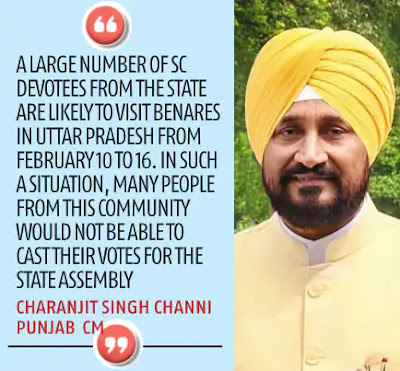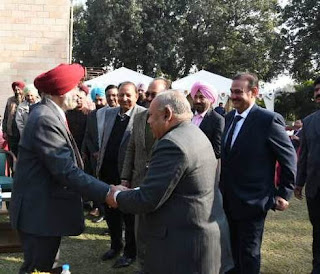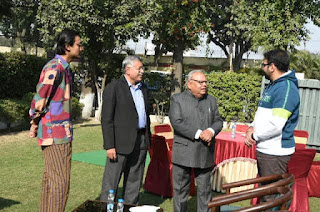Republic Day, January
26 – A good occasion to reflect
The Republic day, our National Day, is celebrated with great pomp and show and due solemnity every year since January 26, 1950, the day our constitution came into effect and India became a Republic. It is an important day having roots in our freedom struggle - 26 January was chosen as in 1929 on the same day the Indian National Congress denounced colonial rule and proclaimed Purna Swaraj, “complete
freedom from the British” This completed the country's transition into becoming a Sovereign Republic in 1950. For the first four years,
1950-54, Republic Day was celebrated in the national capital Delhi at different venues – Red Fort, Ramlilla Grounds, Irwin Stadium and Kingsway and the venue was permanently shifted the Rajpath in 1955. Every successive year, a foreign dignitary or dignitaries are invited to the occasion as the Chief Guest/Guests, with a view to engage our global partners and interlocutors in our international outreach as a responsible and dignified member of the comity of nations. President Sukarno of Indonesia was the foreign guest in the first Republic day on January 26, 1950. In 1955 when the venue was shifted to the Rajpath, the Chief Guest was Governor General of Pakistan, Malik Ghulam Muhammad. There have been occasions, 1952, 1953, and 1966, when no guest was invited due to one reason or the other like, in 2021 and now in 2002. PM of the UK, Boris Johnson was to come in 2021 but could not make it due to Covid precautions and again in 2022, it was all set to invite the Head of States of our extended neighborhood, the Central Asia but again the Covid restrictions did not allow this to happen and there will be no Chief Guest at the celebrations this year too.
 |
| Republic Day in 1950 |
Ever since, 1950, India, a land of 135 crore people, has come
a long way but still to go a long way to wipe the tears of the every citizen
and usher India to the path of development and prosperity as visualized our
forefathers and stipulated in our constitution. Let us observe and celebrate
the solemn occasion of the Republic day this year as a day to reflect on our
achievements, failures, weaknesses, strengths and the way ahead to keep
ourselves on track. It is imperative to do so, if we want to see our country as
a land of happiness and prosperity for all its citizens and the world at large.
As I said that we have come a long way. Our first priority was to have constitutional governance to bind us together in the wake of mayhem and instability created by the partition of the country at the dawn independence in 1947. It was a matter of satisfaction that our forefathers gave us one of finest constitutions to begin with. I often feel and say that India is India today only because of the constitution otherwise the ‘Nay Sayers’ were waiting with the question ‘Who after Nehru’. We proved them wrong. PMs Indira and Rajiv were eliminated in violence by the inimical forces a leaving but nothing happened and Indian constitutional system prevailed. By now, India is the largest functional democracy of the world with vibrant and one of the fast moving economies. We could defend and reserve our territorial integrity and security in spite of volatile borders with hostile neighbors, Pakistan and China. From net food importer till 1960s, the US calling it a ‘bottomless pit”, is now a net food exporting country. India excelled in IT sector and also industrial development to integrate with the world economy. Our strides in the space and scientific excellence remained equally impressive.
Infrastructure development, particularly the highways and metros have been impressive. These factors led us to the current agenda of “Atamnirbhar Bharat”. India could face and meet the challenges of current Covid pandemic with confidence in spite of initial problems. On the flip side, I will not shirk to admit that we are not still out of the woods. A large chunk of the society is still living the poverty line. Health and Education could not get due attention and priority. The Administration, the public services are, unfortunately, have bogged down under corruption. On the social front, the very basic malice of ‘Caste’ could not be addressed even after 70 years of our efforts to establish a ‘casteless’ society as visualized and stipulate in the constitutional framework. Our mid-night pledge” Tryst with Destiny” taken on the night of August 14, 1947 is yet to be redeemed fully. All the successive governments since independence have done their best in the process to make India a land of our dreams. But more needs to be done by all of us - all political, social and spiritual dispensations. Let us maintain and preserve the cardinal values of secularism, integrated society, democracy, pluralism keeping in mind the principles of ‘Equality, Liberty, Justice and Fraternity’ so beautifully enshrined in the very Preamble of the Constitution. Let us not fail ourselves by failing the constitution. There is a greater need to adhere to the values of ‘constitutional morality’ the very edifice of ‘Raj Dharma’. Babasaheb Ambedkar, father of the constitution, asserted and rightly so, in his last speech in the Constituent Assembly on November 25, 1949, “I shall not therefore enter into the merits of the Constitution. Because I feel, however good a Constitution may be, it is sure to turn out bad because those who are called to work it, happen to be a bad lot. However bad a Constitution may be, it may turn out to be good if those who are called to work it, happen to be a good lot.”
The way ahead for us is not to harp on our differences but on agreements and similarities. Let us arrest and kill the divisive tendencies in the polity and society. Let us work in concert to establish a casteless society. Let us address the glaring economic divide among the haves and have-nots. Let us not try to gain brownie points in twisting the history. Let us ward ourselves off from the small irritants and political slugfest on issues like shifting of Amar Jawan Jyoti from India Gate to the National War Memorial and avoidable controversy on the issue of due recognition of the role and persona of Netaji Subhash Chandra Bose. It is difficult to erase history by twisting the facts.. The truth would ultimately emerge and
appear. Finally, Let us not encourage and resort to communal divide for short term political gains instead try to bring about political polarization on the basis of prograame, agenda and ideology in our polity and listen to the warnings given by Babasaheb Ambedkar while reflecting on the future of The Republic of India. While reflecting on the fact that as how India lost her independence before, Dr. Ambedkar said, “Will history repeat itself? It is this thought which fills me with anxiety. This anxiety is deepened by the realization of the fact that in addition to our old enemies in the form of castes and creeds .we are going to have many political parties with diverse and opposing political creeds. Will Indian place the country above their creed or will they place creed above country? I do not know. But this much is certain that if the parties place creed above country, our independence will be put in jeopardy a second time and probably be lost forever. This eventuality we must all resolutely guard against. We must be determined to defend our independence with the last drop of our blood.”
Greetings on the Republic Day – Jai Hind – Jai Bharat
Postscript:
The Republic Day ceremonies traditionally conclude with
Beating of Retreat at the Vijay Chowk by the select bands of Indian Armed
Forces, an impressive ceremony. According to media reports one of Mahatma
Gandhi’s favourite Christian hymns “Abide With Me” has been dropped from this
year’s Beating Retreat ceremony. “Abide With Me”, written by Scottish Anglican
poet and hymnologist Henry Francis Lyte in 1847, has been part of the Beating
Retreat ceremony since 1950. The Beating Retreat used to end with the “Abide
With Me” hymn. This year’s ceremony will conclude with ‘Sare Jahan Se Acha’,
the brochure stated. Undoubtedly, Sare Jahan Se Acha is the best National Song
of India and, prima facie, it seems a good decision. But hunch is that in these
days of increasing communal divide some ‘Sirfiras’ may stand up and oppose the
good intentioned gesture as the Nazam Sare Jahan Se Acha was written by Allma
Iqbal, one of the main protagonists of Pakistan. Let us not listen to such mad
caps.






















